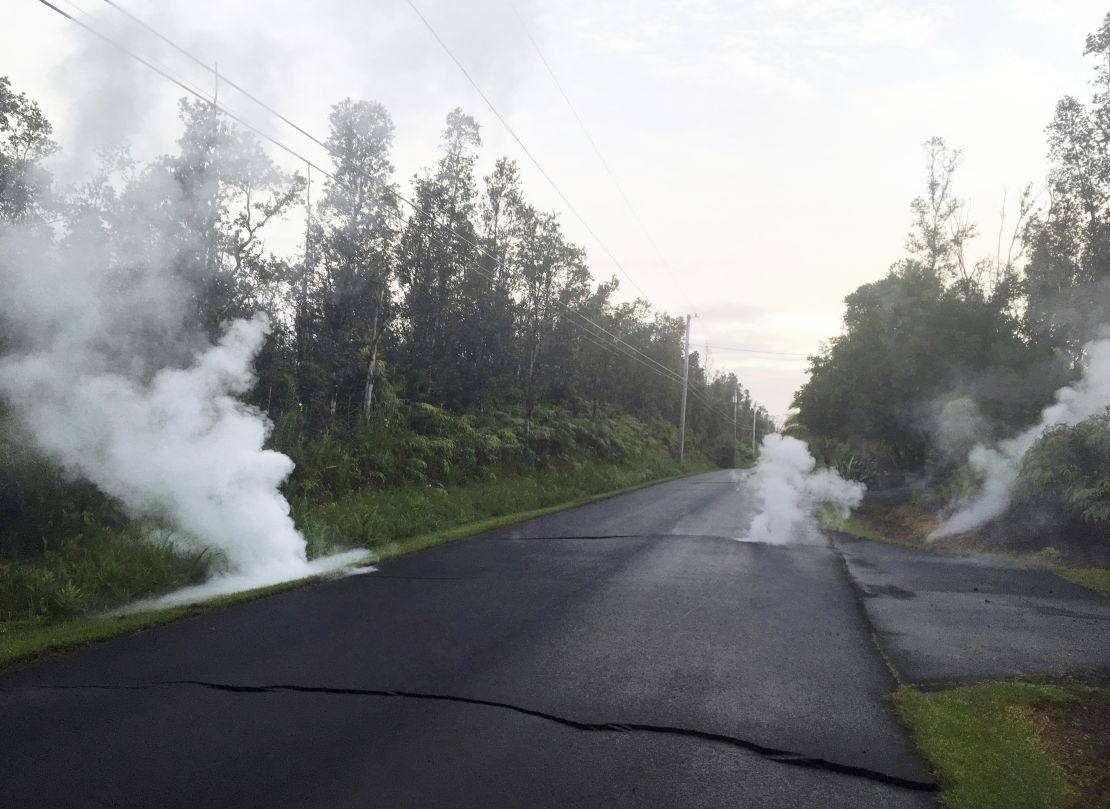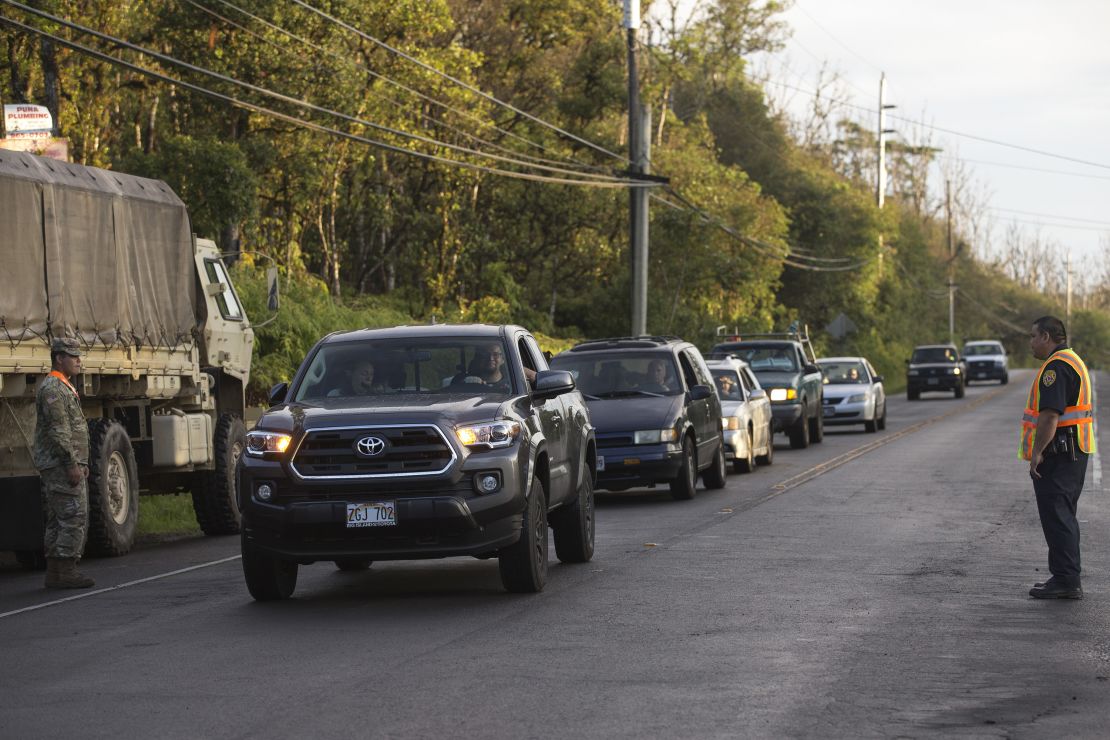For residents of the Big Island of Hawaii, Friday was a day of fraught nerves as a strong earthquake shook their homes, which are increasingly threatened by a volcanic eruption that doesn’t show any signs of slowing down.
The magnitude 6.9 temblor that jolted the island was one of more than 110 earthquakes in just 24 hours. It knocked out power to some residents who were already dealing with mandatory evacuation orders, molten rock and high levels of sulfur dioxide in the air.
The situation wasn’t getting any better, Civil Defense Administrator Talmadge Magno told reporters Friday afternoon.
“Activity continues. It doesn’t look like it is slowing down,” he said.
Magno said five volcanic vents have opened and indicated that at least one home and another structure were destroyed by lava.
It is highly unusual to see the vents so far from Kilauea volcano, he said.
Hundreds of people have evacuated from Leilani Estates, a community of about 1,700 people, and Lanipuna Gardens. Harry Kim, mayor of Hawaii County, said the government will support residents, including those who want to go back to their homes to pick up some belongings.
“We have to work with them as to how we are going to minimize (the inconveniences) as best as possible,” he said. The mayor said people who want to check on their homes would be allowed into the neighborhoods.

‘We had to evacuate,’ resident says
Stephen Clapper said there was no choice.
“We had to evacuate. My mother was out of portable oxygen, so that’s a first concern. She’s 88 years old,” he told CNN affiliate KHON.
Clapper became one of hundreds of residents to flee the threats from the volcanic eruption. He said he told his mom on Friday morning to pack a bag, just in case.
But with lava setting trees ablaze and threatening homes, and with gas coming out of cracks in the ground, Clapper went back to the house, got his mother and the dogs, swept up some of his clothes in one arm, and took off for a shelter.
Cracks in Kilauea volcano’s rift zone – an area of fissures miles away from the summit – erupted Thursday and early Friday, spurting lava near the island’s eastern edge.
US Geological Survey seismologist Jana Pursley said there have been 119 earthquakes on the Big Island since Thursday afternoon. The USGS said Friday’s 6.9 quake was the most powerful on the island since 1975.

About 14,000 customers of Hawaii Electric Light lost power immediately after the earthquake.
“We’ve had some unofficial reports there (is) some damage to some buildings,” spokeswoman Rhea Lee-Moku said.
Lee-Moku said power has been restored to about half of the customers who were without, but sulfur gas levels in some areas are beyond what Hawaii Electric Light deems safe so they cannot work in those places.
“When you are exposed to that level of SO2 in the Leilani Estates area you need more protection than we have available to us,” she said.
KHON reported that some viewers on the island of Oahu, about 200 miles away, felt the shaking.
Lava shoots into the air
Video posted on social media showed lava spewing several feet into the air from a new crackin a Leilani Estates street. Aerial videos showed lava searing a long orange and smoky line through a wooded area.
Jeremiah Osuna, who used a drone to record one of the videos Thursday, said the area “sounded like if you were to put a bunch of rocks into a dryer and turn it on as high as you could,” according to KHON.

“You could just smell sulfur and burning trees and underbrush and stuff,” Osuna said, according to the TV station. “I couldn’t believe it. I was kind of shaken a little bit and realizing how real everything is, and how dangerous living on the East Rift can be.”
Leilani Estates resident Meija Stenback told CNN affiliate KITV that she left the area with her family. The eruption came after hundreds of earthquakes shook the eastern side of the Big Island over four days, and residents had been warned an eruption was possible.
“We knew it was coming, and even now it’s … really surreal at this point,” Stenback told KITV.
A thick plume of smoke and ash also rose Thursday from the Puu Oo volcanic vent, roughly halfway between Kilauea’s caldera and Leilani Estates.

Concerns about sulfur dioxide
Destructive molten flows weren’t the only concern. Volcanic eruptions can release potentially dangerous sulfur dioxide – and fire department personnel have detected high levels of the gas in the evacuation area, the civil defense agency said.
Exposure to high levels of sulfur dioxide could be life-threatening, according to the federal Agency for Toxic Substances and Disease Registry.
Breathing large amounts of sulfur dioxide could result in burning of the nose and throat and breathing difficulties, the agency says.
Senior citizens, the young and people with respiratory issues have extra incentive to leave the evacuation zone, because they are especially vulnerable to the gas, the state’s Emergency Management Agency said.
Gov. David Ige said he’s activated the Hawaii National Guard to help with evacuations and security.
“I urge residents in Leilani Estates and the surrounding areas to follow instructions. … Please be alert and prepare now to keep your family safe,” he tweeted.
The Guard will do security patrols and help evacuate residents, Hawaii Adjutant General Arthur “Joe” Logan said.
Kilauea is one of the world’s most active volcanoes. It’s in Hawaii Volcanoes National Park, which closed Friday.
Since Monday, several hundred earthquakes – most of them around magnitude 2.0 – have been recorded in the area. The series of quakes came after a collapseof a crater floor of Puu Oo.
The tremors have jarred residents, who’ve been reporting nearly constant ground vibrations. They have also reported cracks in roads.
“It has now become unnerving,” resident Carol Shepard told KHON.
She said the flurry of earthquakes seemed to happen every minute.
“It’d be like the house would shake. It’d be like somebody that weighs 300 pounds came in my living room, and jumped up and down,” she said.
CNN’s Chris Boyette, Dakin Andone, Keith Allen and Gianluca Mezzofiore contributed to this report.






















